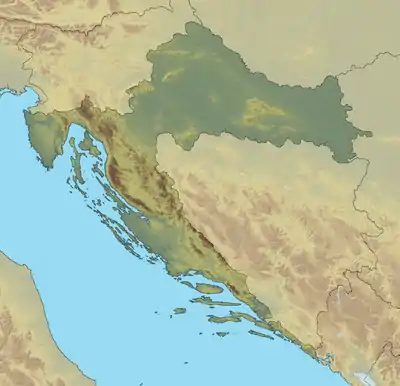Mala Kapela
Mala Kapela (pronounced [mâːlaː kǎpɛla], lit. Small Chapel) is a mountain range in Croatia, part of the Dinaric Alps. It stretches in the direction northwest-southeast, and it extends from the mountain pass called "Kapela" or "Vrh Kapele" (alt. 887 m),[1] that separates it from Velika Kapela, down to the mountain pass that connects Otočac and Plitvice and from then on to Plješevica. The highest peak is Seliški vrh at 1279 meters, located in the southern part of the mountain.[1] The Mala Kapela Tunnel goes through the northern section of the mountain.
| Mala Kapela | |
|---|---|
 Mala Kapela | |
| Highest point | |
| Elevation | 1,279 m (4,196 ft) |
| Coordinates | 44°54′N 15°31′E |
| Geography | |
| Location | Croatia |
| Parent range | Dinaric Alps |
Etymology
In the past, the mountain pass until 1522 was known as Iron Mountain (Alpes ferreae), Gvozd (Gozdia) and Petrov Gvozd (Peturgoz) when due to the chapel of St. Nikola (previously St. Mikula) the population started to call it as Kapela. The pass is considered to have been the place where Croatian King Petar Snačić died in the Battle of Gvozd Mountain (1097), which was previously erroneously identified with Petrova Gora.[2][3][4]
References
- "Geographical and meteorological data" (PDF). Statistical Yearbook. Croatian Bureau of Statistics. 2009. Retrieved 2011-09-19.
- "Gvozd". Croatian Encyclopedia (in Croatian). Miroslav Krleža Institute of Lexicography. 18 October 2012. Retrieved 22 February 2015.
- "Petrova gora". Croatian Encyclopedia (in Croatian). Miroslav Krleža Institute of Lexicography. Retrieved 22 February 2015.
- Jelaska Marijan, Zdravka (2002). "Dolazak ugarskoga kralja". Hrvatska revija (in Croatian). Matica hrvatska (4). Retrieved 22 February 2015.
| Wikimedia Commons has media related to Mala Kapela. |
